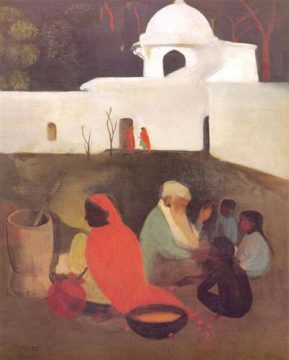by Gus Mitchell

When we hear the constant cry–that we need “better stories”–there is surprisingly little followup. How or where we are going to find them, how are they going to be told? The “how” is the thing.
Knowledge, our fetishizing of knowledge, our demand that we have an opinion on every new fact makes us utterly helpless, leaves us feeling that we don’t really “understand” any of it at all. Our most constant daily ritual is that of the scroll, the instantaneous return to the temple of information.
In our lack of knowledge and our lack of power, we can at least choose the stories we want to be told. Indeed, we have more choice than ever before. Why then, are we constantly told that our suiciding world’s crisis is “a storytelling crisis?”
Storytelling is a power relationship, a good, beneficial, and safe kind of power. The power is that the storyteller knows something which you do not, and which you want to lean forward to hear, to catch.
Nietzsche’s Last Man has no one to tell him a story. The Last Man is stuck in a world of cold realism, which paradoxically keeps seeming less and less real, less comprehensible.
Is the problem partly that the only civilization we have, which still shrilly declares itself to be the only possible arrangement of things, the last word on a realistic way of living, good or bad, is, in fact, fundamentally fantastical? (Unreal?)
Tolkien stated the fundamental principle of story: “If you really come down to any large story”, he said in 1966, “that interests all people’s attention for any period of time, those stories – human stories – are always practically about one thing, aren’t they? Death. The inevitability of death.”
Whether Tolkien meant death as always literal, or more in terms of “rites of passage” or simply change and the slowness of time, he was right.
As the fantastical hyperrealists that we are today, we seem convinced, still––even as the physical reality of Limit looms ever-close on the horizon––that overriding limits is the essence of the story, of what it means to be the heroic human being.
In The Epic of Gilgamesh, the hero’s quest ends with his learning that: “Life, which you look for, Gilgamesh, you will never find. For when the Gods created man, they let death be his share, and life withheld in their own hands.”
In his essay, “The Storyteller”, Walter Benjamin writes from the Europe of the 1920s: “The art of storytelling is reaching its end because the epic side of truth, wisdom, is dying out.” Benjamin was looking at a newly homogenising world, yet one also fragmented, and traumatised: “at the end of the war…men returned from the battlefield grown silent.”
Modernity (then and now) is evermore steeped in a rising (anti) logic––a near-universal political fatalism. This was part of the payoff in turning God into “the Market/the Economy.”
One of the many paradoxes of what we (still) call modernity, that this age, the one supposedly defined by man’s ambition and ability to conquer limits and make himself into the God he killed, has left more people feeling more deeply (consciously and unconsciously) powerless and hopeless than at any other time in history.
The modern conception and propagation of “information”, Benjamin wrote, was the real cause of the death of storytelling. In his time, it was an expanding mass media in newspapers and radio. In ours it is the Hum: our daily fabric, the air itself. “Information” is a displacer of the emptiness of time and space (the emptiness of freedom) in which people could hear and listen to their own lives.
So for the listener, still desperate for the sense-making mystery of story yet trapped in the seductive barrage of the informational loop; commentaries upon commentaries upon commentaries; in the Smartphone Age, of scroll without end; world become flat; experience subordinate to information about everything; everything, including art, including emotions, including stories, consumed only as information, just as sharing and arguing over “information” (truth) has just become a new kind of storytelling; so, “the gift for listening is lost and the community of listeners disappears”.
Benjamin finally offers this formulation: “The counsel woven into the fabric of real life is wisdom.” The inclusion of “counsel” and “wisdom” might well seem to contradict what a good story means to our ironic ears. He was unapologetic. Every real story is useful, and wisdom (unrelated to information) does exist.
Because a story is defiantly not information––properly taken––even if we do read it in the coded “bits” of a screen. It is life transfigured into life: moving from and through and into life, it moves us as it moves, literally. Information, as its phonetic spelling-out would suggest, stands still. It does not move us.
So, what to do when “real life” is no longer real, its fabric not human but mere Hum, when everything we encounter is transfigured into and encountered only as––information?
Like Tolkien, Benjamin knows that “death is the sanction of everything the storyteller can tell. He has borrowed his authority from death.” He, too, wonders just what we are doing, in trying to hide from death.
We seem determined or helpless (difficult to know which) in our blocking out of contemplation, rest, boredom, emptiness, silence, darkness, sleep––a paradoxical dream of perpetual shocks and jolts, of ceaseless speaking and forgetting. But we may have to awake to the dark from which the stories come.
To be Continued…
